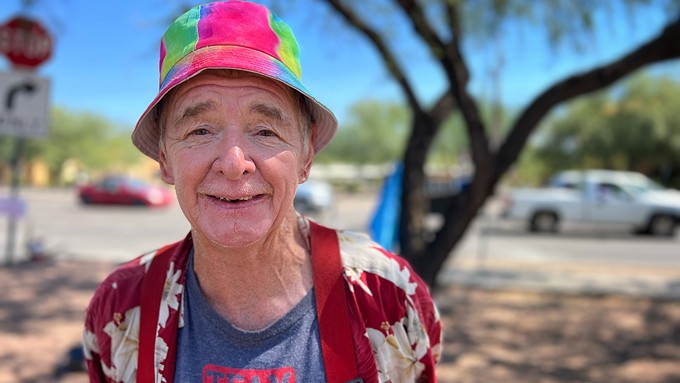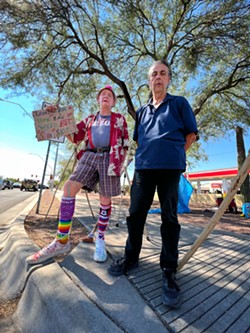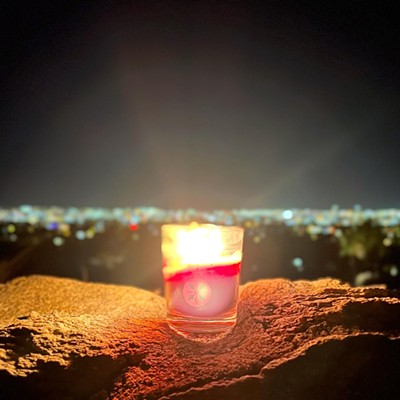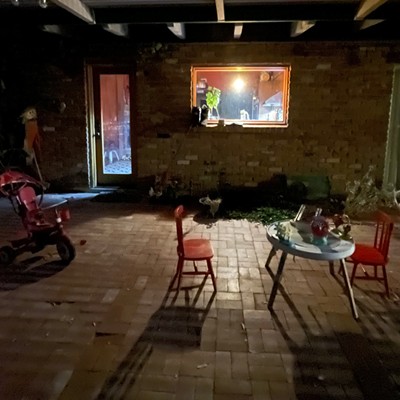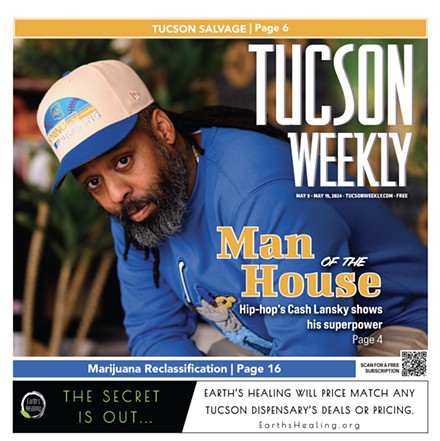The public bus squeals to a stop. Some chaos ensues as Anthony and Jonathan climb down from it onto the street. Anthony huffs to strap onto his back his long homemade wooden walking sticks. Jonathan unfurls a collapsible red wagon, into which they place a milk crate, cholla skeletons, backpack, big water jug, cardboard street-flying signs, a hat or two, a can of shellac, and well-used art supplies. The bus, peppered with impatient rider faces, pulls out and disappears down the road.
The pair amble in the hot morning sun through the Circle K’s parking lot to a bordering mesquite tree where they’ll set up shop. Jonathan pulls the wagon; Anthony keeps odd time on a slight limp. A first impression suggests Joe Buck and Ratso Rizzo, decades later. The two arrive at the tree, spark up and share a pipe. The Saturday Tucson street air is spiced with the familiar: exhaust, weed and mesquite.
Anthony Salterberg is the more alpha of the two, famous in certain street circles as “The 420 Man.” His sidekick is Jonathan Thomas, slightly darker-skinned, who Anthony calls “The Sandman.”
***
Out here, Anthony seems to float above everything around him. He wears mismatched knee socks (one rainbow, the other Mickey Mouse), a “Team Jesus” tee beneath a flower-print kimono thing, and plaid madras shorts, belted and suspendered. Once he changes hats, from a scally hat to a tie-dye bucket cap, he comes alive, a corner song-and-dance man. His obvious penchant for forgotten vaudeville works like a sustained hobo skit from the deep recesses of your grandpa’s memories, a hallucinogenic-damaged Red Skelton.
He carries that even as he erects his walking staffs into a trio of little teepee skeletons on the Swan Road sidewalk to peddle to passersby.
Jonathan is perched on a little barrier wall that separates the Circle K from the busy Swan Road, a quiet observer of Anthony. “He is always like this,” he says. Jonathan is well-groomed with swept-back dark hair, blue shirt, his grin fortified on a missing front tooth. He follows Anthony’s orders today, to, say, erect the blue tarp from the tree, to hang on the street sign cardboard placards, which read, Walking staffs, half-off, $20 apiece,” and “Looking for a dime bag of weed but short $10.”
Jonathan explains the two were lovers, but now they bicker. “The only time we don’t is when we are sleeping,” Jonathan laughs. He adds, “I tried to have a relationship with him. I wish he would come down to Earth sometimes, but he never does. I can’t reason with him. He yells at himself constantly.”
Anthony joins him on the wall, works the weed, sweat beading his forehead. He pulls off his trusty about-town New Balances and slips on a pair of custom paint-spattered tennies, thrift-shop fittings now Jackson Pollock abstracts.
“I have a Hawaiian shirt I’ll change into later.” He smiles, stands, offers a little heal-and-toe polka dance on the gravel beneath the mesquite, and, in his sometimes indecipherable yet deep, rich voice, says, “I dress everyday like I’m on vacation.”
His triangle eyes and jester’s grin tend to sparkle in his theatrics, imparting kindness and joviality, all of which probably saved him from swerving into the cruelest derelictions in his life. The facial wrinkles and furrows show grueling roads, fatigue and sadnesses beneath that glow. He often speaks of his life in quippy self-effacing monologues, even recalling days when he’d lose his temper and walk out on jobs, yet he shifts topics and scenes with the eagerness of an ADHD-addled school boy switching between Minecraft and Resident Evil video games.
Anthony sometimes employs storyteller devices. Despite his tired eyes and limp, he’s attuned to attention. In a flash, he picks up a discarded beer can and launches into a skit involving a character he created, a hippie on a phone explaining how the world has come unglued around him. His dialog is satirical and telling, filled of promising notions, but he stops midway through, bored, and glances over his shoulder to a car stopped at the light. He turns to face it, slides his legs akimbo on the gravel, and waves hysterically. The woman passenger catches this guy, in his mad thrift-store glam, framed by this weird blue tarp and spear-like sticks, and is half-alarmed. She lifts her eyebrows and shoulders, and forces a weak smile.
“See,” Anthony says. “You gotta wave to pretty girls.” He adds, apropos of nothing, “I’m bisexual!”
A man in dark glasses steps up from the side of the Circle K, a graybeard in unwashed clothes, whom the two had never met. He walks over and hands Anthony a half-smoked joint. Anthony is elated and shakes furiously the gifting hand. The man turns around and walks back toward the Circle K, saying over his shoulder, “Don’t smoke that one too fast; it kicks.”
“See, people just give me the stuff!,” he laughs. "This is what happens when you are known as the 420 guy.” He tells of a biker who recently handed him a $50 bill.
When a deflated comic’s humor seeps into sadness, when a persona slides into truth, it’s funny until it isn’t. Anthony suggests he understands this idea, but he won’t give in. “The attitude comes with how you present yourself,” he says. “It comes back.”
Anthony is more than a month behind on rent for his studio apartment, which he’s lived in since his 60th birthday in January; the first six months were free courtesy of the city and a public housing wait list he’d been on.
“I need to go to Social Security for help,” Anthony says. “Really, I fly my signs, that’s what I do.” Someone pilfered his backpack, which contained his pad and phone. “It about crippled him,” Jonathan adds.
Anthony worked in area restaurants for 35 years, off and on, landscaping, too. He knows his way around a kitchen; he is quick to try to remember names of head cooks who taught him everything he knows. Black Angus let him go after eight years. “I was out of control. I made the specials; I was the man," he says.He worked at Robert’s Restaurant for 13 years. “I was only late twice.” One day, he got pissed and walked off. “Stupid me. I thought I was tough. Then I depleted my funds, got evicted.” Out to the streets.
He is an inch away from living solely on the streets again. “And I’m a pack-rat. Where do you think I do all my work.” He pauses and says, “I need to get a job.”
Technically, he says, he is disabled; hence, the limp. “I still jump fences and walls, but not like I used to.” He pauses. “I’m not in a big hurry these days.”
He talks about a local church, the Connections Vineyard. How he stumbled upon it and stayed. “It was powerful, and I started getting clothes and food from them, and I help when I can. I’ve never been able to read the Bible, but the pastor, David, is the only one who ever makes sense to me. We’re like a family over there. Listen, I’m not a Bible-thumper, don’t get me wrong.”
He pulls his red suspenders out from out his belly and lets them snap back. “A couple from the church gave me these. My pants were falling off, and I think they got tired of seeing my ass!”
Growing up Anthony bumped heads with his dad (“all my fault”), but was close to his mother. “I called my mom by her first name.”
The family moved to Tucson from Phoenix when Anthony was 16 years old. He dropped out of Tucson High, or, he laughs, “Too-Stoned High.” Soon, he was “a stupid kid, a womanizer, doing cocaine, blackouts, spending all my money. I went by “Tony,” but I killed him off and became my birthname Anthony.” He was once around-the-clock angry, he says, but three years ago, he made a New Year’s Eve resolution to quit being an asshole. “I open doors for people. I do kind things, share things. I would think, ‘Even if I’m not getting weed today, I won’t be angry.’ So I stopped. It wasn’t easy.”
Anthony has no children but married once, years ago. His wife offered an ultimatum: quit drinking and quit smoking pot, or else. “I called her bluff,” he laughs, “and I got screwed. I will say she was nympho, but don’t write that!”
It is palpable, his love of his nieces and nephews, his five siblings, one of whom (a brother) died. “A brain tumor exploded in his head. I barely got over it.” He adds, “My sister and I were born 364 days apart. My loving sister would be clueless if she had to live on the street.” To put a kicker on such family talk, he outstretches his arms, the Circle K street logo behind him, and shouts with hammy delight, “I’m the black sheep of the family.”
Anthony would rather talk about his walking staffs. He claims his tree limbs, sticks and cactus plant skeletons, are from area washes. He cuts and debarks the five- and six-foot sticks while Jonathan sands them down. Anthony stains them, lately with coffee grounds, beet and cranberry juice. He fits the bottoms with rubber handicap endcaps from crutches, or even a baby shoe he finds randomly on the street or in dumpsters. One is decorated with tiny pics from an old Playboy magazine, others with various print cloths, zebra, rainbow. The sticks, most of which are fashioned from juniper trees, are smooth, durable. And they sell. “My sticks are me,” Anthony says. “People recognize my work.” His “420” hand-scrawled signature sports each piece.
The man says he has “been homeless” three separate stretches in his life. The last time, he lived in a wash, created a small community of weed lovers, made a sign that said “anti-blue.” He says, “My community was all green; no fentanyl allowed.” That’s where Jonathan and Anthony met, three years ago.
Jonathan appears patient with Anthony’s nonstop action, smiles when I look at him. On Anthony’s urging, Jonathan tells a story in his East-Coastian burr, occasionally dropping ‘R’ sounds. He grew up lonely in Maine, “wasn’t raised properly, pawned off, no structure.” He was staying with his grandma in Freeport, Maine. One night, he ran out of money and alcohol; enter boredom and anxiety. He goes walking. He sees a closed mall fitted into an old city structure, lots of dried wood. He torches it. The half-city block structure goes up. He never got caught. He shakes his head, “I was really embarrassed. It was really stupid," he says.
His mother and grandmother died, and Jonathan inherited a house, couldn’t afford the mortgage. Lost it.
He boarded a Greyhound with a one-way ticket to Tucson in 2014, with nowhere to go, knowing no one. He’d heard there was a “lot of help for homeless here,” to which he shakes his head. The first night, he slept beside a liquor store; the second, outside a bar; the third night, in a homeless shelter.
***
Anthony shouts over the roar of a passing Harley. “I was laughing a week before my 40th birthday that I’d never been to jail. I spent my 40th birthday in jail! Drunk and disorderly.” An 18-pack and a bottle of whiskey, his daily ritual. He quit for good three years ago. “People have been telling me to quit for years. One day, I decided it tastes like shit. I used to drink Milwaukee’s Best Ice, the lowest of the low.”
Anthony pulls from the spliff in Jonathan’s hand. He returns to the sidewalk to seduce driver interest in his walking staffs.
Jonathan nods at Anthony, says quietly, “We’re not drinkers anymore. But G, yeah. And weed, of course.”
Anthony overhears, steps over and performatively, with the white and rainbow-hued plastic Unicorn on his finger, pulls a lacy pink scarf from his pocket, which houses his meth pipe.
“You said it!” he says to Jonathan. He turns to me, says, “Oh, well. Got any? I’m out.”
Jonathan worries about Anthony. “What can I do?” he says in a hushed tone. “Let him kill himself? I don’t have a say in that. He’s been complaining about chest pains; a heart attack is coming. He knows better."
A moment later, Jonathan adds, “He is still homeless. Some people are in denial.”
So far today, the walking-stick sales are nonexistent, and Anthony hardly seems to mind. He lifts his arms straight above his head, grins big and wide. “What do you think is my busiest day?” He answers himself. “Four-twenty!”
Brian Smith's collection of essays and stories, Tucson Salvage: Tales and Recollections of La Frontera, based on this column, is available worldwide on Eyewear Press UK. Buy the collection in Tucson at Antigone Books, 411 N. Fourth Ave. You can also pickup his collection of short stories, Spent Saints (Ridgeway Press).

